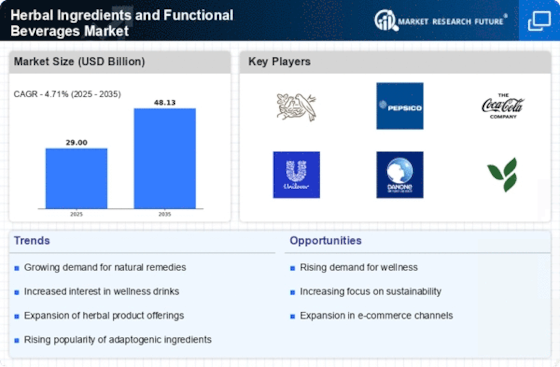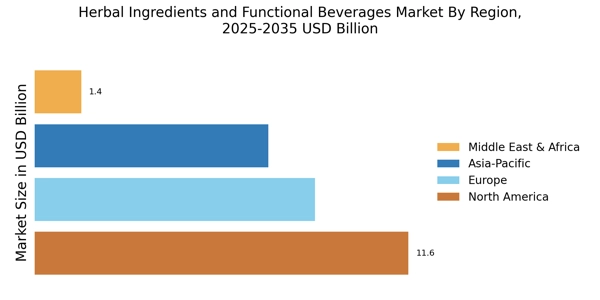Rise of Preventive Healthcare
The Herbal Ingredients and Functional Beverages Market is significantly influenced by the rise of preventive healthcare. As individuals become more proactive about their health, there is an increasing inclination towards beverages that offer functional benefits. Products infused with herbal ingredients are perceived as beneficial for enhancing immunity, improving digestion, and promoting overall well-being. Market analysis indicates that the functional beverage segment is expected to witness a growth rate of around 7% annually, driven by this preventive healthcare trend. This shift suggests that consumers are not only looking for hydration but also for beverages that contribute positively to their health, thereby reshaping the Herbal Ingredients and Functional Beverages Market.
Growing Popularity of Herbal Teas
The Herbal Ingredients and Functional Beverages Market is witnessing a growing popularity of herbal tea, which are often lauded for their health benefits. These beverages are increasingly favored for their potential to provide relaxation, detoxification, and various therapeutic effects. Recent statistics indicate that the herbal tea segment is expanding at a rate of approximately 6% per year, reflecting a shift in consumer preferences towards more natural and holistic beverage options. This trend is indicative of a broader movement within the Herbal Ingredients and Functional Beverages Market, where consumers are gravitating towards products that align with their health-conscious lifestyles.
Innovation in Beverage Formulation
Innovation plays a crucial role in the Herbal Ingredients and Functional Beverages Market, as manufacturers continuously explore new formulations to attract consumers. The introduction of unique flavor combinations and functional ingredients is becoming increasingly prevalent. For instance, beverages that combine adaptogenic herbs with traditional flavors are gaining traction. This innovative approach not only enhances the sensory experience but also aligns with the growing consumer demand for multifunctional products. Market Research Future suggests that innovative formulations could drive a significant portion of the projected growth in the Herbal Ingredients and Functional Beverages Market, potentially reaching a valuation of several billion dollars in the coming years.
Increasing Demand for Natural Ingredients
The Herbal Ingredients and Functional Beverages Market experiences a notable surge in demand for natural ingredients. Consumers are increasingly seeking products that are free from artificial additives and preservatives. This trend is driven by a growing awareness of health and wellness, as well as a desire for transparency in food sourcing. According to recent data, the market for herbal ingredients is projected to grow at a compound annual growth rate of approximately 8% over the next five years. This shift towards natural ingredients is not merely a passing trend; it reflects a fundamental change in consumer preferences, which is likely to shape the future of the Herbal Ingredients and Functional Beverages Market.
Focus on Sustainability and Ethical Practices
The Herbal Ingredients and Functional Beverages Market is increasingly characterized by a focus on sustainability and ethical practices. Consumers are becoming more discerning about the environmental impact of their purchases, leading to a demand for products that are sustainably sourced and produced. Companies that prioritize ethical sourcing of herbal ingredients are likely to gain a competitive edge in the market. Recent surveys indicate that a substantial percentage of consumers are willing to pay a premium for products that align with their values regarding sustainability. This trend suggests that the Herbal Ingredients and Functional Beverages Market is not only evolving in terms of product offerings but also in its commitment to responsible practices.

















